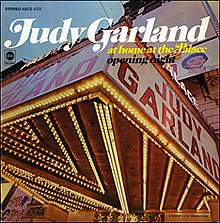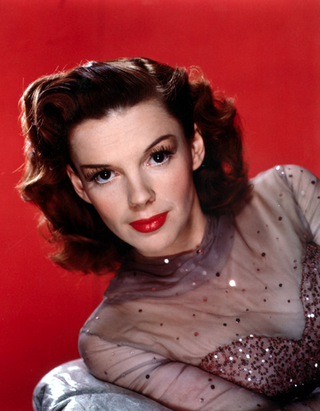
Judy Garland was an American actress, singer, and vaudevillian. She attained international stardom and critical acclaim as an actress in both musical and dramatic roles, as a recording artist, and on the concert stage. Renowned for her versatility, she received a Golden Globe Award, a Special Tony Award and was one of twelve people in history to receive an Academy Juvenile Award.
"Stormy Weather" is a 1933 torch song written by Harold Arlen and Ted Koehler. Ethel Waters first sang it at The Cotton Club night club in Harlem in 1933 and recorded it with the Dorsey Brothers' Orchestra under Brunswick Records that year, and in the same year it was sung in London by Elisabeth Welch and recorded by Frances Langford. Also in 1933, for the first time the entire floor revue from Harlem's Cotton Club went on tour, playing theatres in principal cities. The revue was originally called The Cotton Club Parade of 1933 but for the road tour it was changed to Stormy Weather Revue; it contained the song "Stormy Weather", which was sung by Adelaide Hall.

Lorna Luft is an American actress and singer. She is the daughter of Judy Garland and Sidney Luft, the sister of Joey Luft and the half-sister of Liza Minnelli.

Harold Arlen was an American composer of popular music, who composed over 500 songs, a number of which have become known worldwide. In addition to composing the songs for the 1939 film The Wizard of Oz, including "Over the Rainbow", which won him the Oscar for Best Original Song, he was nominated as composer for 8 other Oscar awards. Arlen is a highly regarded contributor to the Great American Songbook. "Over the Rainbow" was voted the 20th century's No. 1 song by the RIAA and the NEA.

"Over the Rainbow", also known as "Somewhere Over the Rainbow", is a ballad by Harold Arlen with lyrics by Yip Harburg. It was written for the 1939 film The Wizard of Oz, in which it was sung by actress Judy Garland in her starring role as Dorothy Gale.
"Have Yourself a Merry Little Christmas" is a song written in 1943 by Hugh Martin and Ralph Blane and introduced by Judy Garland in the 1944 MGM musical Meet Me in St. Louis. Frank Sinatra later recorded a version with modified lyrics. In 2007, ASCAP ranked it the third most performed Christmas song during the preceding five years that had been written by ASCAP members. In 2004 it finished at No. 76 in AFI's 100 Years...100 Songs rankings of the top tunes in North American cinema.
Hugh Martin was an American musical theater and film composer, arranger, vocal coach, and playwright. He was best known for his score for the 1944 MGM musical Meet Me in St. Louis, in which Judy Garland sang three Martin songs, "The Boy Next Door", "The Trolley Song", and "Have Yourself a Merry Little Christmas". The last of these has become a Christmas season standard in the United States and around the English-speaking world. Martin became a close friend of Garland and was her accompanist at many of her concert performances in the 1950s, including her appearances at the Palace Theater.
"The Man That Got Away" is a torch song written for the 1954 version of A Star Is Born. The song, with music by Harold Arlen and lyrics by Ira Gershwin, is performed in the film by Judy Garland. "The Man That Got Away" was ranked #11 by the American Film Institute on the AFI's 100 Years...100 Songs list. It was nominated for Best Original Song at the 27th Academy Awards but lost to "Three Coins in the Fountain".

I Could Go On Singing is a 1963 British-American musical drama film directed by Ronald Neame. It stars Judy Garland in her final film performance alongside Dirk Bogarde, and Jack Klugman. Originally titled The Lonely Stage, the film was renamed so that audiences would know that Garland sings in it; she had not sung in a film since A Star Is Born in 1954.
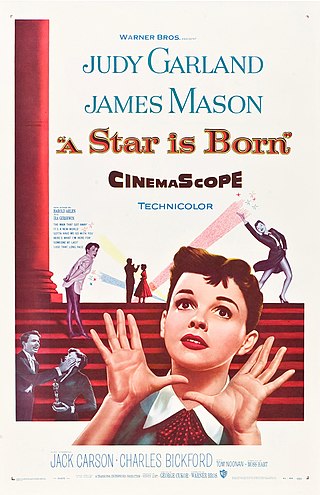
A Star Is Born is a 1954 American musical tragedy film directed by George Cukor, written by Moss Hart, and starring Judy Garland and James Mason. Hart's screenplay is an adaptation of the original 1937 film, based on the original screenplay by Robert Carson, Dorothy Parker and Alan Campbell, and from the same story by William A. Wellman and Carson, with uncredited input from six additional writers—David O. Selznick, Ben Hecht, Ring Lardner Jr., John Lee Mahin, Budd Schulberg and Adela Rogers St. Johns.
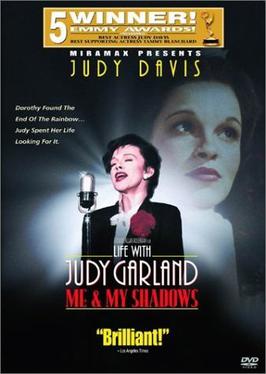
Life with Judy Garland: Me and My Shadows is a 2001 American two-part biographical television miniseries based on the 1998 book Me and My Shadows: A Family Memoir written by Lorna Luft, the daughter of legendary singer-actress Judy Garland. The miniseries was directed by Robert Allan Ackerman and originally broadcast in two parts on ABC on February 25 and 26, 2001.
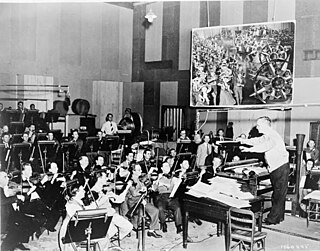
The songs from the 1939 musical fantasy film The Wizard of Oz have taken their place among the most famous and instantly recognizable American songs of all time, and the film's principal song, "Over the Rainbow", is perhaps the most famous song ever written for a film. Music and lyrics were by Harold Arlen and E.Y. "Yip" Harburg, who won an Academy Award for Best Song for "Over the Rainbow."
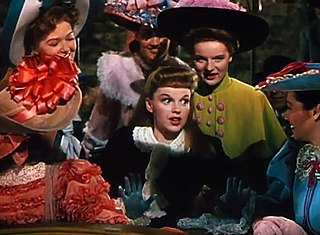
"The Trolley Song" is a song written by Ralph Blane and Hugh Martin and made famous by Judy Garland in the 1944 film Meet Me in St. Louis.
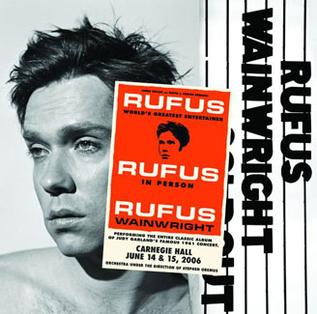
Rufus Does Judy at Carnegie Hall is the sixth album by the Canadian-American singer-songwriter Rufus Wainwright, released through Geffen Records in December 2007. The album consists of live recordings from his sold-out June 14–15, 2006, tribute concerts at Carnegie Hall to the American actress and singer Judy Garland. Backed by a 36-piece orchestra conducted by Stephen Oremus, Wainwright recreated Garland's April 23, 1961, concert, often considered "the greatest night in show business history". Garland's 1961 double album, Judy at Carnegie Hall, a comeback performance with more than 25 American pop and jazz standards, was highly successful, initially spending 95 weeks on the Billboard charts and garnering five Grammy Awards.

Rufus! Rufus! Rufus! Does Judy! Judy! Judy!: Live from the London Palladium is a DVD by the Canadian-American singer-songwriter Rufus Wainwright, released under Geffen Records in December 2007. The film consists of live recordings from his sold-out February 25, 2007, tribute concert at the London Palladium to the legendary American actress and singer Judy Garland. The DVD complements the release of Wainwright's Grammy Award-nominated double album, Rufus Does Judy at Carnegie Hall, which contains the same songs from Garland's well-known 1961 album, Judy at Carnegie Hall. The DVD also includes several songs not included on Wainwright's album release.

End of the Rainbow is a musical drama by Peter Quilter, which focuses on Judy Garland in the months leading up to her death in 1969. After a premiere in Sydney, Australia in 2005, the show has played on the West End in London and a Broadway production opened at the Belasco Theatre in 2012. The award-winning 2019 film Judy starring Renée Zellweger is a screen adaptation of the play for which Zellweger won the Academy Award for Best Actress.

Garland at the Grove is the debut live album by Judy Garland. It was released in mono on February 2, 1959 and in stereo on February 16, 1959 by Capitol Records, and accompanied by Freddy Martin and his orchestra. The album was recorded at the Cocoanut Grove nightclub at the Ambassador Hotel in Los Angeles.

Judy is a 2019 biographical drama film based on the life of American entertainer Judy Garland. Directed by Rupert Goold, it is an adaptation of the Olivier- and Tony-nominated West End and Broadway play End of the Rainbow by Peter Quilter. The film stars Renée Zellweger, Jessie Buckley, Finn Wittrock, Rufus Sewell, and Michael Gambon.
